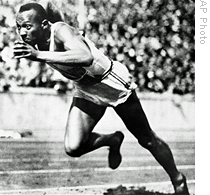Berlin
19 August 2009
 |
| Jesse Owens at the 1936 Berlin Olympics |
Hitler hoped to use the 1936 Olympics as a showcase for Nazism and his assertion of a superior white Aryan race. But it was an American sharecropper's son, Jesse Owens, who provided the ultimate truth.
Owens dispelled Hitler's theories on the track, winning gold medals in the 100 and 200 meters, 4x100-meter relay and long jump. His accomplishments so angered Hitler that the German leader refused to acknowledge Owens or shake his hand after the competition.
 |
| Sanya Richards |
"He has been such a great hero to us in sport and especially for someone like me [an African-American], so I'm excited to represent his spirit," Richards said. "Even though I never had a chance to talk to him, I can imagine when he was here how he had to stay focused against all the odds. And to pull off four gold medals, that is an amazing accomplishment.
In a strange twist, it was a German athlete, Luz Long, who helped Owens win his long jump gold medal. Owens fouled during his first two qualifying attempts and was facing elimination. But Long, who set an Olympic long jump record during qualifying, gave Owens advice on how to improve his take-off.
Following his suggestions, Owens easily qualified for the final, where he won the gold and Long earned the silver. The friendship between the two men was obvious as they walked from the stadium together that day, and their families remain in contact to this day.
Jesse Owens died of lung cancer in 1980 and Luz Long was killed in action during World War II. Following the suggestion of the U.S. team, Owens' granddaughter, Marlene Dortch, and Long's son, Kai, will award the medals for the men's long jump final on August 22.